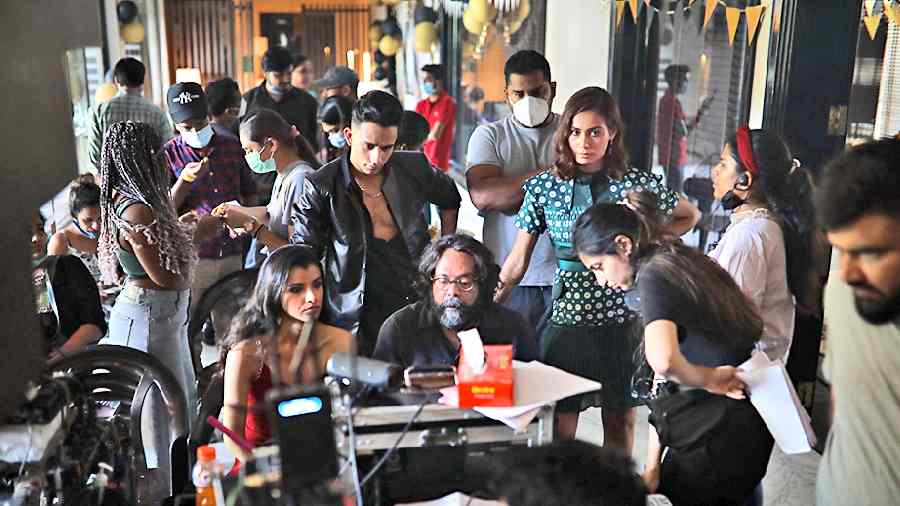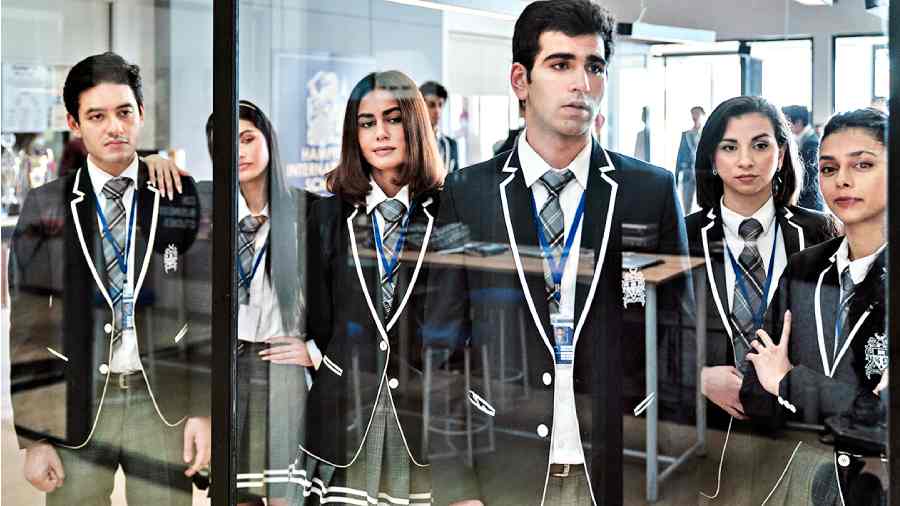Scandalously entertaining remake’. ‘Top-tier guilty pleasure’. ‘Brave and unabashed’. These are some of the many reactions that have been handed out to Class, Netflix’s eight-episode series that looks at a variety of issues through an uninhibited lens and focuses on the chasm between the haves and the have-nots in a Delhi school.
Adapted from the Spanish series Elite, also available on Netflix, Class stars a bunch of fresh-faced youngsters and is directed by Aashim Ahluwalia, the man behind films like Miss Lovely and Daddy. The Telegraph chatted with Ahluwalia on the polarised reactions to Class, his journey with it and the impact it’s had.
Class is possibly one of the boldest and most bindaas— to put it mildly — Indian shows in recent times. What have the reactions been like?
Let’s start with the bad stuff! (Laughs) The initial reaction was, ‘Oh, it’s a sasta Elite, it’s an Indian Elite....’ It was generic feedback, very expected because I knew Class was an experiment... there was already a show like this on the same platform and I was simply making another version of it. I also made a strong choice to keep the story beats of Class identical to that of Elite. I used the original as source material. It’s like a mythological story... we all know the story, we know the outcome, we know the characters, but ultimately it’s the telling that is different. So I really wanted to focus on the telling and the psychology of the characters in terms of why they do what they do. So the first criticism that came in is not even relevant because it was always my intention to follow the beats of the original story. I just had to change the telling and the whole lens changed.
Honestly, Class is possibly the easiest of all the projects that I have made because it’s pulpy, it’s accessible and you can watch it without engaging with the layers if you don’t want to. My work, in general, has always been a little arthouse and complex and while Class has a layer running along the bottom, you can also just look at it purely from the story point of view and ignore everything else if you have to. The good thing about this series is that it gives the viewer different entry points into the story.
Overall, it’s been well appreciated and I am a bit surprised, to be honest. Not just by young audiences, but even older people — and those I would not expect to like something like this. I can’t complain, honestly.
What’s your biggest takeaway from the positives?
What I have been truly shocked by is how audiences have wholeheartedly accepted the complex characterisations in Class. They have appreciated the fact that all the characters are very grey. They all have reasons to be the way they are and the viewer has understood that. The kids on the show can be off the rails and pretty twisted at times. It could have easily been dismissed as, ‘Oh, you are just showing depraved people, it’s just so dark.’ That, thankfully, hasn’t happened.
That, of course, is a function of our audiences growing up. Since I made Miss Lovely (starring Nawazuddin Siddiqui) which was 10 years ago, I have seen a huge shift in the way that the audience has been able to perceive material. They don’t look at a story as just being that of a hero or heroine... their idea of resolution is no longer about, ‘Tell me what happened... is he good or is he bad?’
The audience is now enjoying the politics present in a story, the idea of caste, homophobia and the way it works... they are nonjudgmental and are not looking out for a moral science lesson. Normally, our issue-based filmmaking is very judgmental — it’s either good or bad. In the case of Class, I have left it open-ended for the audience to read what they want to in the story and the fact that that has been appreciated is very surprising. I had expected a pushback because I don’t give easy answers to anything!
The connect could also have happened because of the relatability factor....
Yes. But honestly, we still don’t have that much content which is very real. Of course, we do see that increasing now because of the streaming platforms, but still, our characters can be quite fantastical and our situations can be quite sugarcoated.
But for a high-school show, Class has a lot of realism and intensity. We haven’t soft-peddled or skirted around issues... we have been pretty direct. So there is definitely a degree of maturity within the audience to accept that and not judge it.

Aashim Ahluwalia (centre) with the cast of Class. Picture: Sachin Soni
What was your first reaction when you were approached to direct Class? It’s not really the kind of material that you have been associated with so far....
I was always interested in doing stuff around teenagers who are rebellious... I wanted to make a feature film but I never found the right source material or the right project.
Class happened by accident. I was in the middle of an international project that got stalled because of the lockdown. I was asked if I would be open to doing a series for Netflix and I was told that it was an adaptation of the Spanish show Elite. I hadn’t watched it then and I was asked to do so. I felt it was very different from what I do... it was in a very telenovela style and it had a glossy touch which is not really my thing. And honestly, I also judged it when I watched it. I was like, ‘Okay, there is this bad, rich kid and these innocent poor kids.’ But somewhere in the middle, it really took me by surprise because the story went in a direction that I really didn’t expect. it to. I really liked the writing which spoke to me and it felt very relevant to India.
Though it’s a kind of soap opera, it’s very pulpy, and soap opera is anyway a hyperbolic representation of real life... I liked the idea of putting it in real life. And eventually, it became closer to my world than it appeared at first.
It also has parallels with my work. Like two brothers falling in love with the same girl has a similar track in Miss Lovely. The feeling of betrayal, the element of noir where nobody can trust each other and what starts off as friendship then comes anything but... these are storytelling elements that I really love because you never know which way it will go. So, it kind of felt right for me.
What were the biggest challenges of adapting Elite to the Indian context?
I knew that the story would get into not just class but also caste. It’s all intersectional... you can’t talk about class without caste because they are separate and yet interconnected and hence complex. At the same time, I knew that this was a TV show for young kids and I didn’t want to make a pamphlet or a moral story. But there were some elements that I wanted to put in, like making Saba (played by Madhyama Segal) hail from Kashmir and what that means in today’s times and how it would play out in a school of this kind.
Also, in Elite, the police investigation is just a plot device, but in Class, we contextualised it against the backdrop of corruption. In Class, I wanted to give more meat to the parents because I felt that the adults in Elite were very weak. If we had kids completely off the charts, we needed to show what their parents were like.
So the challenges were to bring in things that were relevant but not force-fit them... they had to feel organic to the plotline, whether it’s love, caste or homophobia. I wouldn’t actually call them challenges... these were just new ways of thinking about the material.
Does Class mark a turn for you as a film-maker?
I think it establishes a connection and conversation with an audience which was otherwise difficult for me to have. Like a film like Miss Lovely needed to be financed from outside and I didn’t have much of a window here theatrically. The distribution system here is very tentpole, commercial and blockbuster-oriented and that is not my space and it isn’t something I am even interested in.
Even Daddy (starring Arjun Rampal as gangster Arun Gawli) was put out in 2,000-3,000 cinemas on Friday and on Monday, when people counted the numbers, it didn’t match up. That’s not the style of film-making I believe in. I need to find my audience and my audience needs to find me.










